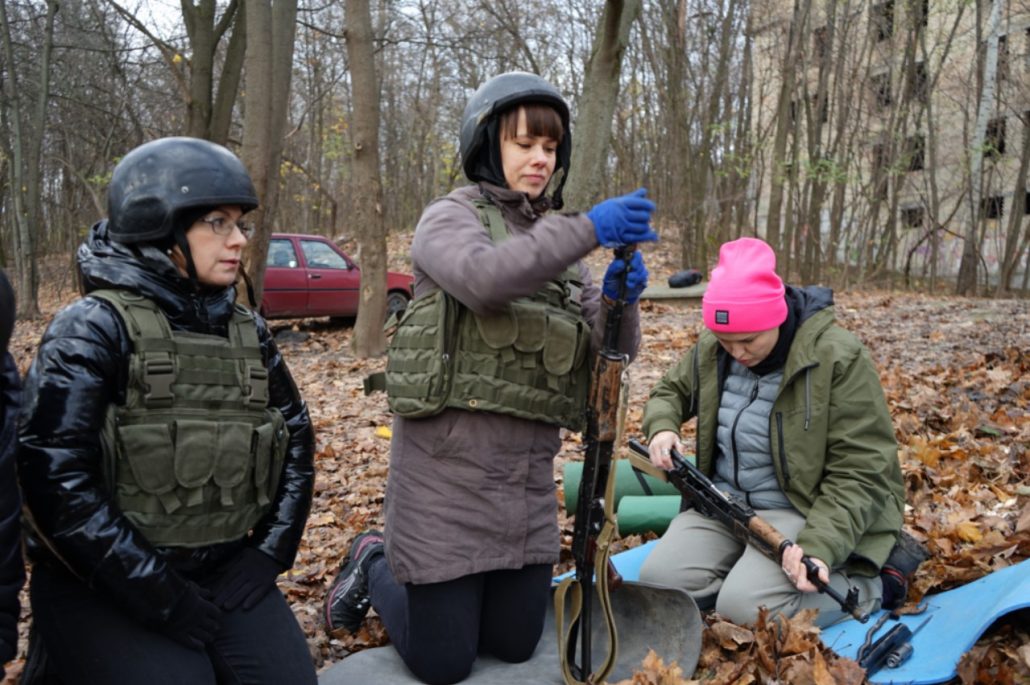
За два останні роки кількість жінок у ЗСУ збільшилася на 40% і складає 62 тисячі, 43 тисячі з них — військовослужбовиці. Медикині та фармацевтки повинні стати на військовий облік в обов’язковому порядку до кінця 2026 року. Для представниць інших професій служба в армії добровільна. Проте війна з Росією триває й час від часу виникають питання, чи доведеться державі мобілізувати жіночу половину населення в разі ще більшого загострення?
Спеціально для «Поваги» представниці різних професій розповіли, що вони думають про мобілізацію жінок, чи готові до цього та навіщо їм бойова підготовка в мирних містах.
Мир, який укладає жінка, —триваліший
«Коли почалася повномасштабна війна, моя мама сказала: «Як добре, що в мене доньки». Так відповіла аккаунт-менеджерка в ІТ Оксана, коли я запитала її думку про обов’язкову мобілізацію для жінок. Але проблема набагато глибша.
Західний фемінізм відрізняється від фемінізму українського або навіть «фемінізму українських реалій». Зазвичай феміністки країн Європи вважають, що жінка — це про безпеку, мир, про налагодження конфліктів. У неї більше шансів досягти успіху під час перемовин ворогуючих сторін. Мир, який укладає жінка, триваліший. Ці тези закладені в Резолюцію ООН 1325 «Жінки. Мир. Безпека», яка закликає збільшувати кількість жінок в оборонному секторі.
Читайте також: Коаліції 1325: як громадським організаціям ефективно співпрацювати з владою?
Україну захищають її люди — більше нікому
Спілкуючись із західними феміністками про жінок в армії, зокрема і про ЗСУ, бачу, що вони часто уникають радикальних відповідей. Наприклад, на запитання, як збільшити кількість лідерок в армії чи «уявляєте, у нас ще досі немає жіночої форми у війську», вони можуть відповісти: «Розуміємо, війна — це так жахливо».
Тобто відчувається посил, що воєн не повинно бути в принципі. Війна — це не тільки не про жінок, війна — це не про людей і не про людяність загалом, а жінки мають запобігати конфліктам, а не брати в них участь. І це абсолютно нормальна і природна думка. Воювати не повинен ніхто. Але що ж робити, якщо війна вже є? Вона на твоїй землі. Ворог знищує твоїх людей, і щодня гинуть і чоловіки, і жінки. Який шанс, що ця війна могла б закінчитися чи не починатися, якщо би президентом чи головнокомандувачем була жінка? В українського суспільства немає часу на ці роздуми і припущення. Війна вже в Україні, Україну захищають її люди — більше нікому.
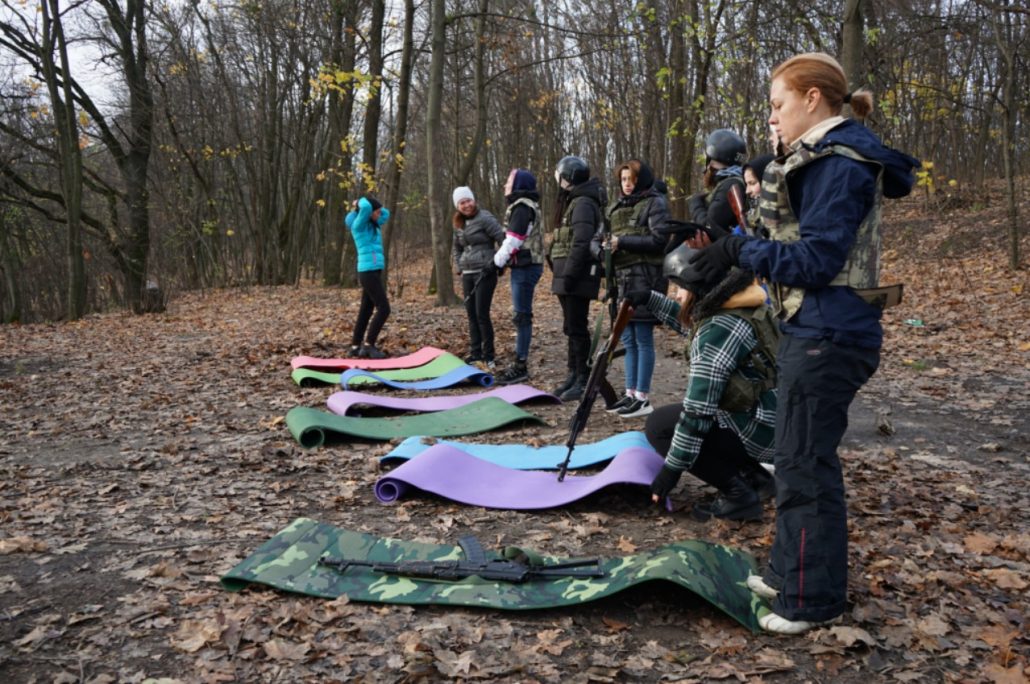
«Очевидно, що країна-агресорка переважає в кількості. Тому рано чи пізно нарівні з чоловіками почнуть призивати й жінок. Жінка так само, як і чоловік, може здобути військову освіту, обіймати керівні посади, керувати ротою чи батальйоном. Але її недооцінюють.У війни немає статі. Мобілізація для жінок може стати звичним процесом, тому на державному рівні було б доцільно організувати обовʼязкові курси для цивільних. Хоча б раз чи двічі на тиждень. Із різних військових напрямків чи загальні, щоб жінки могли надалі обирати напрямок, який їм до вподоби. Це стосується і чоловіків, яких ще не призвали», — вважає офіс-менеджерка мережі брендових магазинів Олена.
Про досвід Ізраїлю
Ізраїль давно зрозумів, що найцінніший її ресурс для захисту — це люди. Вся ідеологія існування громадян і громадянок Ізраїлю — від народження й до смерті — заснована на розумінні, що твоїй країні загрожує ворог. Багаторічна війна навчила Ізраїль (так, навіть така ідеальна система дає збій, але зараз тут не про це), що в будь-який момент твій сусід може напасти. І було би бездумно й небезпечно відкидати 50% ресурсу країни — її жінок. Тому готують до відбиття агресії всіх. Спочатку це патріотичне виховання в школі та в сім’ї. Після школи — 3 роки обов’язкової служби в армії або два роки служіння державі в громадському секторі, де ти також робиш корисні для країни речі, наприклад, у лікарні чи на заводі, і проходиш підготовку. І лише після цього ти думаєш про вищу освіту, роботу чи сім’ю. Якщо ти з глибоко релігійної родини і служба в армії суперечить твоїм релігійним переконанням — ти служиш Богу.
Читайте також: Людмила Ясененко, медикиня: Мені говорили, що я маю народжувати дітей і варити борщ
Селище врятувала 25-річна координаторка з військової безпеки
Населення Ізраїлю менше за населення України в 4 рази, площа країни приблизно як площа Львівської області. Чисельність ЗСУ більша за чисельність Армії оборони Ізраїлю втричі, навіть якщо призвати всіх резервістів ЦАХАЛу. Так, цих речей не можна порівнювати, на перший погляд, і, здавалося б, в Україні є кому воювати. Але так само можна порівняти армію України та Росії, а також виснажливу війну з російською армією та її мільйонними резервами.
7 жовтня, коли ісламістське угруповання ХАМАС напало на Ізраїль, кібуц Нір-Ам виявився практично єдиним селищем у прикордонній із сектором Гази смузі, що серйозно не постраждав. Це сталося завдяки діям 25-річної Інбаль Рабін-Ліберман — координаторки з військової безпеки в цьому поселенні. Вона швидко організувала оборону селища, роздала зброю, виставила пости і змогла мінімізувати ті трагічні наслідки, які пережили люди в інших кібуцах.
Тож питання — чи далека перспектива, коли жінок в Україні так само, як і чоловіків, почнуть готувати до війни?
«Якщо б сказали, що жінки в обов’язковому порядку мають іти служити, я би пішла без зайвих думок»
«Я колись хотіла піти служити, у 16 років дуже хотіла піти в армію. Моїм вихованням більше займався батько, тому я пацанка з дитинства, мені хотілося відчути щось таке на собі. А потім трішки підросла — і ці думки десь загубилися. Якщо б зараз сказали, що жінки в обов’язковому порядку мають іти служити, я би пішла без зайвих думок. У нас вільна країна, і ми можемо обирати — народжувати й сидіти вдома чи щось інше. Просто не всі жінки створені для армії, як і не всі чоловіки», — каже керівниця салону краси Тетяна.
Читайте також: Жіночі обличчя спротиву: як українки дають відсіч війні
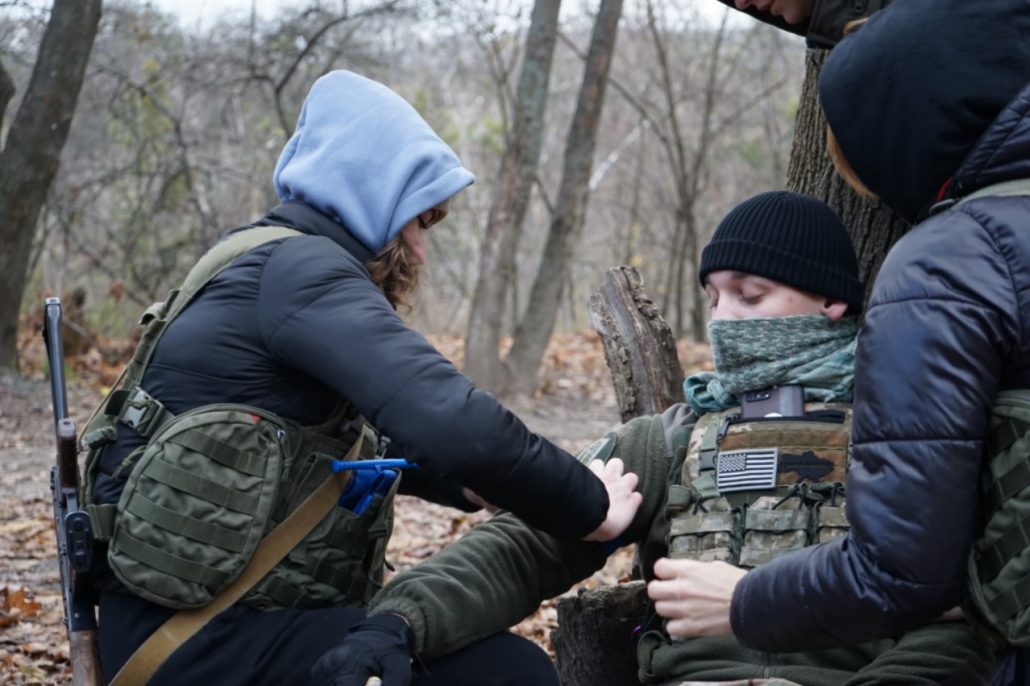
Ми з нею познайомилася в Києві на курсах бойової підготовки для жінок, де вони вчаться опановувати ази військової справи, користуватися зброєю, надавати домедичну допомогу. Близько 20 дівчат щосуботи збирають і розбирають автомат, кидають навчальні гранати, відпрацьовують бойові стійки та проходять естафети з перешкодами. Чоловік Тетяни служить у ЗСУ, і на сімейній нараді вони вирішили, що дружина залишиться вдома, а він піде воювати. Проте жінка хоче мати елементарні навички, щоб зуміти захистити свій дім, якщо туди знову прийде небезпека, як 24 лютого.
«Хочеться трохи більше знати щось про військову справу, бо, можливо, таке станеться, що всім доведеться потрапити на війну. Тому я абсолютно нормально ставлюся до мобілізації жінок. Жінки й чоловіки в однакових умовах, як жінки, так і чоловіки повинні вміти захищати себе, свій дім, свою землю» , — каже офісна працівниця Аліна.
«Якщо треба, то треба»
Тут я зустріла багатьох представниць так званих мирних професій, зовсім недотичних до армії: співвласницю кейтерингової компанії, бухгалтерку, акторку, директорку школи, перекладачку. Олена, наприклад, учителька початкових класів в одній із київських шкіл. У бронежилеті й касці вона знову і знову збирала та заряджала «калаш», доки я не відволікла її своїми запитаннями про готовність до служби.
«Якщо треба, то треба. Після дітей уже нічого не страшно. Знаєте, 24 лютого я була вдома, побігла на роботу, почула вибух і повернулася назад. Далі довелося складати розклад своїм чоловіку та сину, щоб не загубилися. Усім було лячно, але треба було якось їх організувати. Я відповідала за графік, ми поділили обов’язки. Із Києва нікуди не виїжджали», — каже Олена.
Всі дівчата говорили, що тоді, у перші дні повномасштабного вторгнення Росії, вони були розгублені, не знали, що робити, куди себе подіти. Більше таку безвихідь і беззахисність відчувати не хочуть, а прагнуть бути готовими до можливих майбутніх небезпек.
Читайте також: Що потрібно знати про військовий облік для медикинь
Економістка Євгенія працює в банку, в лютому опинилася в окупації, коли в Київську область зайшли росіяни.
«У нас були поранені люди, і якби ми мали тоді ці знання, що ми здобуваємо на тренінгу, я би змогла накласти турнікет чи якось їм допомогти. Це корисні навички, я однозначно рекомендую всім пройти такі курси».
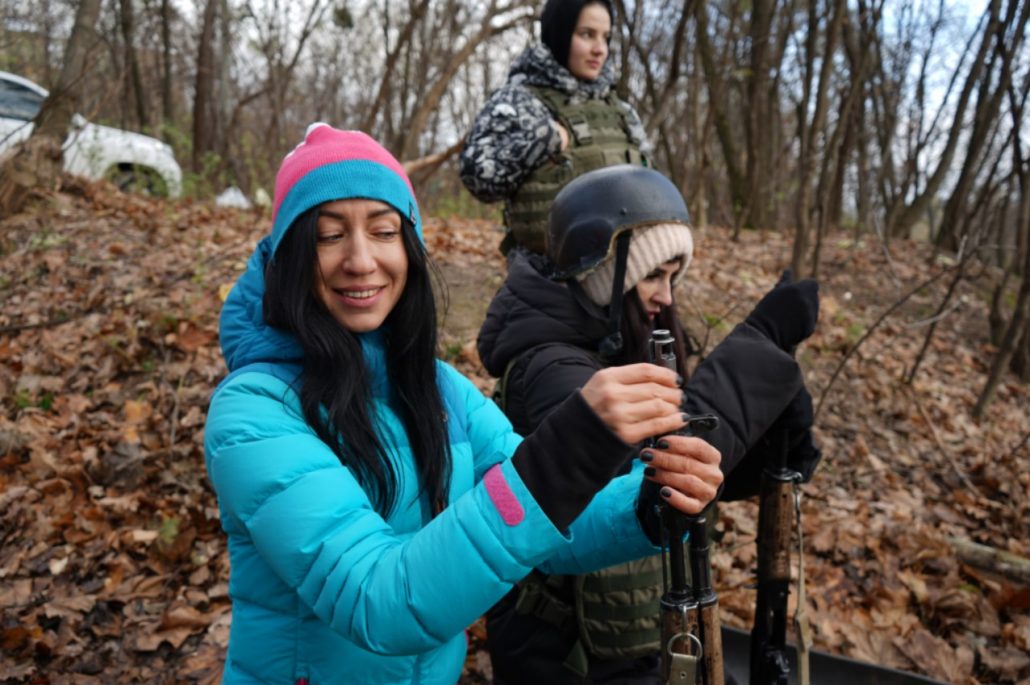
«Ні мій розум, ні психіка, ні тіло до цього не готові»
Я неодноразово чула під час відряджень на фронт, що жінки в армії більш вмотивовані, ніж їхні побратими. Це зокрема обумовлено тим, що жінки йдуть у військо добровільно. Підписати контракт — це їхній виважений і свідомий вибір, у якому вже зашита мотивація. Вона може бути різна, але це власна мотивація.
У чоловіків такого вибору наразі немає. Через це командири скаржаться, що в мобілізованих бійців часто бракує розуміння, що вони тут, в армії, роблять, відсутня ініціатива, бажання чи усвідомлення себе на своєму місці. Можливо, у примусово мобілізованих жінок були б такі ж проблеми?
«Якщо б мене запитали до «повномасштабки», я б сказала, що категорично проти мобілізації. Наголошу — і для чоловіків, і для жінок. Сама суть обов’язкової мобілізації чи будь-чого обов’язкового мене відштовхує. У людини повинен бути вибір, а не примус. Все примусове — це зло, це обмежує свободу людини. І якщо говорити про практичність — не ефективно. Я вірю в мотивацію, в те, що кожен повинен бути на своєму місці. Але тоді і потреби у фронту були зовсім іншими. В теперешніх реаліях — це важке й неоднозначне питання для мене. Як егоїстичний індивідуум — я б не хотіла обов’язкової мобілізації. І, можливо, подумала б про виїзд за кордон. Бо навіть уявити зараз не можу, щоб мене примусили піти десь лежати в окопах і стріляти в людей. Ні мій розум, ні психіка, ні тіло до цього не готові. Мені здається, це мене б привело до величезного жаху і психологічних проблем. Який тоді з мене сенс?» — говорить аккаунт-менеджерка в ІТ Оксана.
«Я проти примусової мобілізації»
Яна — логістка мережі одного з найбільших супермаркетів в Україні, так само вважає, що не готова йти в армію, ні фізично, ні морально.
«До обовʼязкової мобілізації в мене двоякі почуття. З одного боку, жінки не гірші за чоловіків і не поступаються їм ні в чому, хіба що у фізичній силі, але це вже природа, якої не змінити. З іншого боку, я проти примусової мобілізації. Зараз буде трішки сексизму, але я бачу себе як надійний тил. Як мінімум, на фронті потрібна фізична сила — носити боєкомплект, рити окопи тощо.
Більшість жінок із мого оточення не готові до таких навантажень. Щодо обовʼязкових курсів підготовки жінок, то я тільки за! Ми маємо бути готові до всього, повинні мати можливість захистити себе і своїх близьких за необхідності. І нехай ці знання ніколи не знадобляться, але ними має володіти кожен і кожна», — каже Яна.
Головна цінність підготовки — знати свої можливості та слабкі місця
Тренінги з бойової підготовки, виживання чи володіння зброєю зазвичай організовують громадські організації. Ці курси платні, безкоштовні або проводяться за донати на ЗСУ. Але це не є систематичною підготовкою громадянського суспільства й тим більше не є державною програмою країни, що воює. Ефективність цих навичок досягається тільки тоді, коли вони регулярні.
Головна цінність такої підготовки не в тому, що ти одразу стаєш першокласним штурмовиком чи партизаном (або штурмовичкою чи партизанкою). А в тому, що ти чітко знаєш свої можливості і слабкі місця, можеш оцінити обстановку й маєш бодай якийсь план дій.
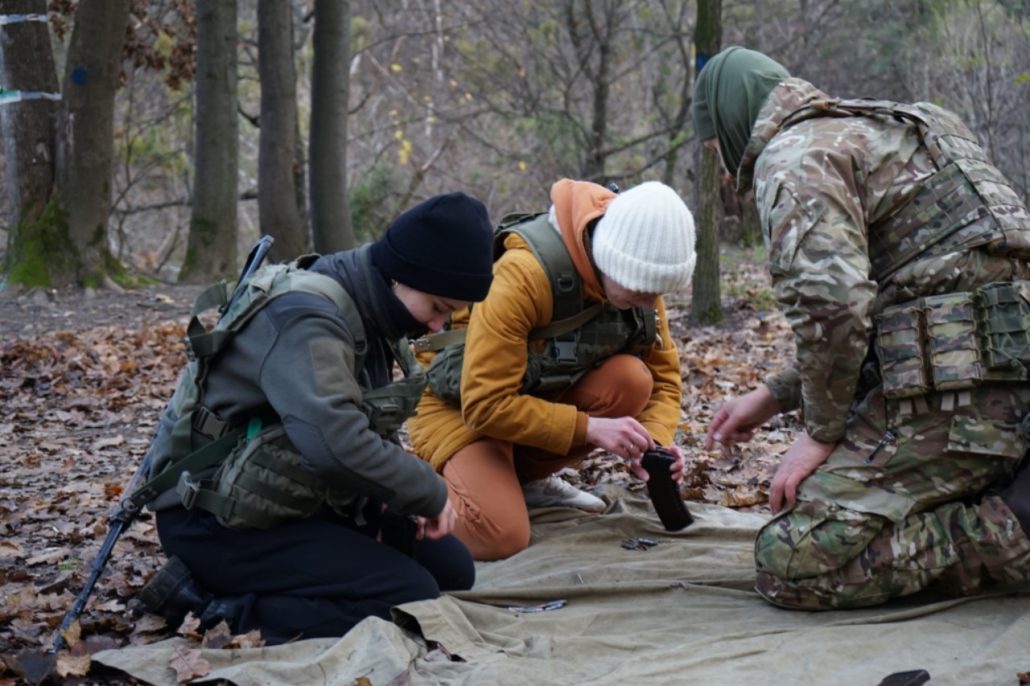
До мобілізації жінок є багато питань
До мобілізації жінок є багато питань. Виписуючи такий законопроєкт, його творцям варто було б урахувати безліч юридичних моментів. Зокрема, догляд за дітьми, якщо такі є. Зрозуміло, що соло-мам, багатодітних мам та жінок, які доглядають за маломобільними членами сім’ї, ніхто б не призивав. Але регулярну бойову підготовку двічі-тричі на рік могли би пройти всі без винятку без відчутного відриву від роботи й догляду за сім’єю.
Операторка мобільних застосунків Катя вважає мобілізацію жінок логічною.
«Якщо буде — окей, так треба. Є жінки, яким не можна йти. Наприклад, вони залишилися самі з дітьми або якщо чоловік на фронті чи загинув. Зараз багато таких жінок. Але фронт треба комусь тримати. Буквально, справжній фронт — не музичний, економічний чи кулінарний, а безпосередньо фронт, щоб наші діти росли у вільній країні на своїй землі», — каже Катерина.
Натомість Оксана висловила тривожність через такі повідомлення про мобілізацію:
«Коли я чую про мобілізацію жінок, у мене виникає враження, що люди закінчуються і скоро будуть всі зі зброєю в руках. Тобто це не про покращення захисту держави, а про те, що в нас стає все тільки гірше й гірше. І водночас постійно бачу в новинах скандали про корупцію, про те, як неефективно розподіляються кошти західної допомоги. Можливо, треба боротися із цим, спрямувати фокус саме сюди, а не збільшувати кількість людей на фронті через посилення мобілізації жінок і чоловіків?..» — міркує Оксана.
***
Можливо, мобілізація жінок — це далека перспектива, проте всі опитані жінки сказали, що хочуть пройти бойову підготовку й мати такі навички навіть для цивільного життя. Військові експерти та й самі військовослужбовці кажуть, що ця війна буде довгою й виснажливою. Виснаження українського війська — це те, чого прагне досягти Росія. Українці й українки не хотіли й не обирали цю війну, але в них поки що є вибір — захищати свою країну чи ні. І, можливо, у майбутньому цього вибору не буде. Тому краще бути готовим фізично й морально до будь-якого розвитку подій. І якщо держава зацікавлена у збільшенні людського ресурсу для захисту країни від ворога, громадянське суспільство варто готувати — неважливо, про чоловіків це чи про жінок.
Ірина Сампан
“I would go without a second thought”: reflections on mandatory mobilization for women in Ukraine
Over the past two years, the number of women in the Armed Forces has increased by 40% to 62,000, 43,000 of whom are military personnel. Doctors and pharmacists must register for military service on a mandatory basis by the end of 2026. For representatives of other professions, military service is voluntary. However, the war with Russia continues, and from time to time questions arise as to whether the state will have to mobilize the female half of the population in the event of an even greater escalation.
Especially for Povaha, representatives of different professions told us what they think about the mobilization of women, whether they are ready for it, and why they need combat training in peaceful cities.
Peace made by women is more lasting
“When the full-scale war started, my mother said: “I’m so glad I have daughters.” That’s what Oksana, an IT account manager, said when I asked her opinion on mandatory mobilization for women. But the problem is much deeper.
Western feminism differs from Ukrainian feminism or even “feminism of Ukrainian realities.” Feminists in Europe usually believe that women are about security, peace, and conflict resolution. They have a better chance of succeeding in negotiations between warring parties. Peace made by women is more durable. These theses are laid down in UN Resolution 1325 “Women. Peace. Security”, which calls for increasing the number of women in the defense sector.
Read also: 1325 Coalitions: How can civil society organizations effectively cooperate with the government?
Ukraine is defended by its people — no one else
When I talk to Western feminists about women in the military, including the Armed Forces, I see that they often avoid radical answers. For example, when asked how to increase the number of women leaders in the army or “can you imagine, we still don’t have women’s uniforms in the army,” they may answer: “We understand, war is so terrible.”
That is, they send the message that there should be no wars in principle. War is not only “not about women”, war is not about people and not about humanity in general, and women should prevent conflicts, not participate in them. And this is an absolutely normal and natural thought. No one should go to war. But what to do if there is already a war? It is on your land. The enemy is killing your people, and men and women are dying every day. What is the chance that this war could have ended or not started if a woman had been president or commander-in-chief? Ukrainian society does not have time for these thoughts and assumptions. The war is already in Ukraine, and Ukraine is being defended by its people – no one else.
“Obviously, the aggressor country is outnumbered. Sooner or later, women will be drafted along with men. A woman, just like a man, can get a military education, hold leadership positions, lead a company or battalion. But she is underestimated. War has no gender. Mobilization for women can become a habitual process, so it would be advisable to organize mandatory courses for civilians at the state level. At least once or twice a week. In different military areas or general, so that women can choose the direction they like in the future. This also applies to men who have not yet been called up,” believes the network’s office manager.
About Israel’s experience
Israel has long realized that its most valuable resource for defense is its people. The entire ideology of the existence of Israeli citizens – from birth to death – is based on the understanding that your country is threatened by an enemy. Years of war have taught Israel (yes, even such an ideal system fails, but that’s not the point here) that at any moment your neighbor can attack. And it would be thoughtless and dangerous to throw away 50% of the country’s resources – its women. Therefore, everyone is trained to repel aggression. First, it is patriotic education at school and in the family. After school, there are 3 years of compulsory service in the army or two years of service to the state in the public sector, where you also do things useful for the country, for example, in a hospital or factory, and receive training. And only then do you think about higher education, work, or family. If you come from a deeply religious family and serving in the army contradicts your religious beliefs, you are serving God.
Read also: Liudmyla Yasenenko, a doctor: I was told I had to give birth to children and cook borscht
The village was saved by a 25-year-old military security coordinator
Israel’s population is 4 times smaller than Ukraine’s, and the country’s area is about the size of Lviv region. The size of the Armed Forces of Ukraine is three times larger than the Israeli Defense Forces, even if all IDF reservists are drafted. Yes, these things are not comparable at first glance, and it would seem that Ukraine has someone to fight. But it is also possible to compare the armies of Ukraine and Russia, as well as the exhausting war with the Russian army and its millions of reserves.
On October 7, when the Islamist group Hamas attacked Israel, Kibbutz Nir Am was practically the only village in the strip bordering the Gaza Strip that was not seriously damaged. This happened thanks to the actions of 25-year-old Inbal Rabin-Lieberman, the military security coordinator in the settlement. She quickly organized the defense of the settlement, distributed weapons, set up posts, and managed to minimize the tragic consequences that people in other
kibbutzim experienced.
So the question is, how far off is the prospect of women in Ukraine being trained for war in the same way as men?
“If they said that women had to serve without fail, I would have gone without a second thought”
“I used to want to serve, when I was 16 I really wanted to join the army. My father was more involved in my upbringing, so I was a tomboy from childhood, I wanted to experience something like that. And then I grew up a little bit, and these thoughts got lost somewhere. If they said now that women have to serve without fail, I would go without a second thought. We are a free country, and we can choose whether to give birth and stay at home or something else. It’s just that not all women are made for the army, just like not all men,” says Tetiana, a beauty salon manager.
Read also: Female faces of resistance: how Ukrainian women are fighting back against the war
We met her in Kyiv at a combat training course for women, where they learn to master the basics of military affairs, use weapons, and provide first aid. Every Saturday, about 20 girls assemble and disassemble an assault rifle, throw training grenades, practice combat stances, and run obstacle courses. Tetiana’s husband serves in the Armed Forces of Ukraine, and at a family meeting they decided that his wife would stay at home and he would go to war. However, the woman wants to have basic skills to be able to defend her home if danger comes there again, as it did on February 24.
“I would like to know a little more about military affairs, because maybe it will happen that everyone will have to go to war. That’s why I have an absolutely normal attitude to the mobilization of women. Women and men are in the same situation, both women and men should be able to defend themselves, their homes, their land,” says Alina, an office worker.
“If you have to, you have to”
Here, I met many representatives of so-called peaceful professions that have nothing to do with the army: a co-owner of a catering company, an accountant, an actress, a school principal, and a translator. Olena, for example, is a primary school teacher in a Kyiv school. Wearing a bulletproof vest and helmet, she was assembling and reloading her Kalash again and again until I distracted her with my questions about her readiness for service.
“If I have to, I have to. After children, nothing is scary anymore. You know, on February 24, I was at home, ran to work, heard an explosion and came back. Then I had to make a schedule for my husband and son so they wouldn’t get lost. Everyone was scared, but we had to organize them somehow. I was in charge of the schedule, and we shared responsibilities. We never left Kyiv,” says Olena.
All of the girls said that back then, in the first days of Russia’s full-scale invasion, they were confused, didn’t know what to do, where to go. They don’t want to feel that kind of hopelessness and defenselessness anymore, and they want to be prepared for possible future dangers.
Read also: What do you need to know about military registration for female doctors?
Yevheniia, an economist, works in a bank and found herself under occupation in February when Russians entered Kyiv region. “We had wounded people, and if we had had the knowledge we are gaining at the training, I would have been able to put up a barrier or help them somehow. These are useful skills, and I definitely recommend everyone to take such courses.”
“Neither my mind, nor my psyche, nor my body is ready for this”
During my business trips to the frontline, I have heard many times that women in the army are more motivated than their male counterparts. This is partly due to the fact that women join the army voluntarily. Signing a contract is their balanced and conscious choice, which already has motivation built into it. It may be different, but it is their own motivation.
Men currently do not have such a choice. Because of this, commanders complain that mobilized soldiers often lack an understanding of what they are doing here in the army, lack initiative, desire or awareness of their place. Perhaps women who are forcibly mobilized would have the same problems?
“If I had been asked before the ‘full-scale’ mobilization, I would have said that I was categorically against mobilization. Let me emphasize – for both men and women. The very essence of compulsory mobilization or anything compulsory repels me. A person should have a choice, not coercion. Anything forced is evil, it restricts human freedom. And if we talk about practicality, it is not effective. I believe in motivation, that everyone should be in their place. But back then, the needs of the front were completely different. In the current realities, this is a difficult and ambiguous question for me. As a selfish individual, I would not want compulsory mobilization. And maybe I would think about going abroad. Because I can’t even imagine now that I would be forced to go somewhere to lie in the trenches and shoot at people. Neither my mind, nor my psyche, nor my body is ready for that. It seems to me that this would lead me to great horror and psychological problems. What good would I be then?” says Oksana, an account manager in IT.
“I am against forced mobilization”
Yana, a logistician at one of the largest supermarkets in Ukraine, also believes that she is not ready to join the army, neither physically nor mentally.
“I have mixed feelings about mandatory mobilization. On the one hand, women are no worse than men and are not inferior to them in any way, except in physical strength, but this is nature, which cannot be changed. On the other hand, I am against forced mobilization. There will be a bit of sexism now, but I see myself as a reliable rear guard. At the very least, you need physical strength at the front – to carry ammunition, dig trenches, etc.
Most of the women in my inner circle are not ready for such stress. As for the mandatory training courses for women, I’m all for it! We must be prepared for anything, we must be able to protect ourselves and our loved ones if necessary. And even if this knowledge is never needed, everyone should have it,” says Yana.
The main value of training is to know your capabilities and weaknesses
Training in combat, survival, or weaponry is usually organized by non-governmental organizations. These courses are either paid, free, or funded by donations to the Armed Forces. But this is not systematic training for civil society, and certainly not a government program in a country at war. The effectiveness of these skills is achieved only when they are regular.
The main value of such training is not that you immediately become a first-class stormtrooper or guerrilla fighter (or stormtrooper or guerrilla fighter). It’s that you know your strengths and weaknesses, can assess the situation, and have at least some kind of action plan.
There are many questions about women’s mobilization
There are many questions about women’s mobilization. When drafting such a bill, its creators should take into account many legal issues. In particular, childcare, if any. It is clear that no one would call up single mothers, mothers with many children, or women who care for family members with limited mobility. But regular combat training two or three times a year could be done by everyone, without exception, without a significant break from work and family care.
Katia, a mobile app operator, believes the mobilization of women is logical.
“If it happens, it’s okay, it’s necessary. There are women who should not go. For example, if they are left alone with children or if their husband is at the front or has been killed. There are many such women now. But someone has to hold the front line. Literally, the real front – not the musical, economic or culinary front, but the front for our children to grow up in a free country on their own land,” says Kateryna.
Oksana, on the other hand, expressed alarm over such mobilization notices:
“When I hear about the mobilization of women, I get the impression that people are running out of men and soon everyone will be armed. That is, it is not about improving the protection of the state, but about the fact that things are getting worse and worse. And at the same time, I constantly see scandals in the news about corruption, about how inefficiently Western aid is being distributed. Perhaps we need to fight this, to direct the focus here, instead of increasing the number of people at the front by increasing the mobilization of women and men?” Oksana thinks.
***
The mobilization of women may be a distant prospect, but all the women interviewed said they want to undergo combat training and have such skills even for civilian life. Military experts and soldiers themselves say that this war will be long and exhausting. The exhaustion of the Ukrainian army is what Russia wants to achieve. Ukrainians did not want and did not choose this war, but they still have a choice – to defend their country or not. And perhaps in the future they will not have this choice. Therefore, it is better to be physically and mentally prepared for any development of events. And if the state is interested in increasing human resources to protect the country from the enemy, civil society should be prepared, no matter whether it is men or women.
Iryna Sampan


